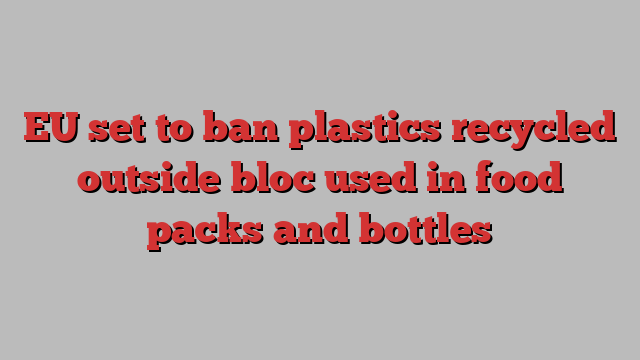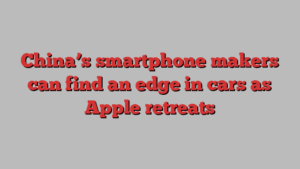
Stay informed with free updates
Simply sign up to the EU trade myFT Digest — delivered directly to your inbox.
The EU is poised to ban the use of most plastic recycled outside the bloc when manufacturing food containers and bottles after a successful last-minute push by France to amend the law in its final stages.
Officials from the European Commission’s trade department are involved in eleventh-hour discussions with governments to reverse the change to the EU’s packaging legislation, arguing that it would drive up prices of everyday products, alienate the developing world and disrupt trade because so many imports are wrapped in plastic.
The amendment was made in a provisional agreement between member states and the European parliament last week and would in effect block plastic that was recycled outside the bloc and not meeting EU standards from being counted towards new environmental targets.
Pascal Canfin, the French MEP chairing the parliament’s environment committee, defended the deal and said that it was “completely unacceptable” that trade officials were calling EU capitals to “kill” it.
“We are creating a new market for recycled plastic with this regulation and we want to make sure there is a level playing field for our industry compared to imports,” he said.
The commission said that it was “analysing” the outcome. A spokesperson for the French representation to the EU declined to comment.
The packaging legislation, first proposed in 2022, aims to cut the amount of waste generated in the EU by setting targets for recycled content and reusable containers. It has been one of the most heavily lobbied pieces of legislation in recent years due to its impact on a vast range of industries from hospitality to logistics.
Italy and Finland have been highly critical of the regulation for the potential impact it could have on their recycling and paper industries.
But the last-minute insertion of requirements to ensure that imported recycled plastic meets the same standards as polymers recycled within the EU is the result of a French effort to safeguard domestic industry, according to people involved in the talks.
Plastic recycled elsewhere would have to follow three separate EU laws, which set standards for emissions, pollution and waste handling that few countries outside the bloc match.
Paris, arguing domestic producers face higher costs because of EU legislation, has repeatedly advocated the use of so-called “mirror clauses” in new laws and trade deals that would oblige third countries to follow the same production methods as those in the EU.
But these generally breach World Trade Organization agreements and have been resisted by more liberal EU members, such as the Netherlands and Germany, and the EU commission.
The bloc’s green agenda is also facing increasing heat from non-EU countries who say it becomes increasingly costly and bureaucratic to trade with the bloc.
EU recyclers have said that allowing recycled waste from third countries would pose an “existential threat” to the bloc’s domestic industry and that the safeguards must be kept.
“We have invested massively in recycling capacity, which is currently idle due to a lack of demand [because] competition from recycled materials from low-cost countries is already an industrial reality,” said Sophie Sicard-Lemaire, deputy director of sustainable development and institutional affairs at the French recycling company Paprec.
“It would be absurd for European consumers to finance the low-cost recycling of Asian packaging while, at the same time, the recycling of European packaging waste remains locked in a permanent price crisis.”
Several member states are also concerned about the “mirror clause” and could reject it at a meeting on Friday where EU ambassadors are due to approve the law. “We are worried about the implications and scrutinising the legislation,” said one EU diplomat. A majority of governments must back it for it to pass.
The EU recycling industry makes €10.4bn in revenue per year, according to Plastics Recyclers Europe. Germany, Italy and the Netherlands have the biggest number of plastic recycling facilities. The EU imported more than 1.4bn kg of PET, the most commonly used plastic in packaging, from third countries in 2022, according to Eurostat data, up from 747mn kg in 2018.
To protect domestic plastic packaging makers, the EU imposed anti-dumping duties of up to 24 per cent on Chinese imports last November.

